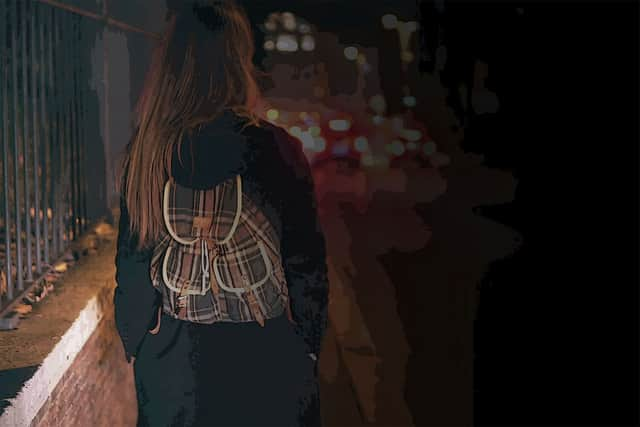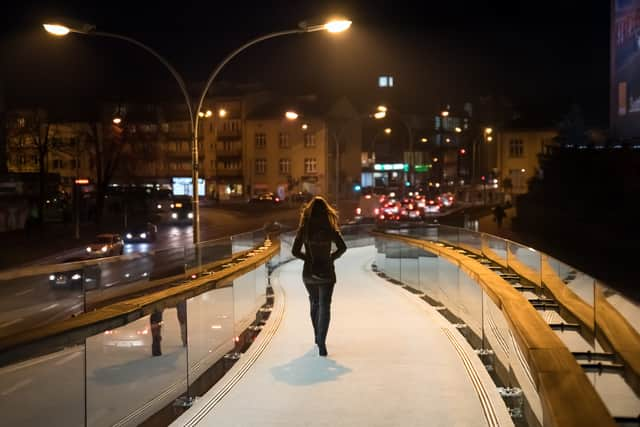The reality of getting home safely for women who work in hospitality: ‘I’ve felt unsafe so many times’
and live on Freeview channel 276
“Text me when you get home” is the parting message familiar to all women before embarking on a late night trip home.
With good reason. At this hour of the night the streets are often quiet, dimly lit, and punctuated with drunken strangers.
Advertisement
Hide AdAdvertisement
Hide AdEvery woman has their habits that help them feel safe if they have to walk home alone in this situation.
“When I’m walking home at night, I always carry my keys in one hand and a rape alarm in the other,” says Amy*, 23. “I wear headphones too, but I never actually listen to music.”
Rather than returning from a night out with friends, Amy is describing her 40-minute walk home along the River Clyde in Glasgow, after finishing a bartending shift in a city centre hotel.
“I was once followed by two huge men,” she recalls. “They were stood chatting and when I walked past, they started shouting at me to stop and talk to them.
Advertisement
Hide AdAdvertisement
Hide Ad“I just kept walking, and then they started walking too and kept shouting. I had to call my flatmate to get him to come and meet me halfway.”


These daunting walks home are the reality for countless women in the hospitality industry, who finish shifts after public transport has stopped running, and can’t afford the steep taxi fares, which can be the sum of a few hours of work and their food for the week.
Amidst the amber weather warnings that came with Storm Dudley, Amy couldn’t even use the city’s bike hire scheme to get home and as she was struggling paying off her university registration fees, and she couldn’t afford the enormous surges in taxi prices. She explained her predicament to her supervisor, but he told her she would have to walk.
“It was lashing with rain, it was three o’clock in the morning and it was a Saturday so there were a lot of drunk people about.
Advertisement
Hide AdAdvertisement
Hide Ad“I felt like he really wasn’t understanding my situation, he just said that he also has to walk home at three in the morning, but he’s a guy... there’s just been so many times that I’ve felt unsafe walking home at night.”
A nationwide issue
The safety of women walking alone at night has been a public concern following the kidnapping, rape and murder of Sarah Everard, and the sexually motivated attack and murder of Sabina Nessa, both of which took place last year while the women were walking home alone.
Experience of sexual assault, verbal harassment, violence and stalking are alarmingly common in the hospitality sector, with a Unite survey finding that over 60% of hospitality workers who responded had either experienced or witnessed sexual harassment in the workplace.
Caitlin Lee was sexually assaulted while trying to find a taxi home after a Friday night shift in Glasgow city centre. She had been promised a taxi by her employer when she agreed to the shift but was then sent home early to get the last bus, which never turned up.
Advertisement
Hide AdAdvertisement
Hide AdCaitlin told Unite that when she reported the assault to her employer IHG, the world’s largest hotel company, she was told that they “are not responsible for your health and safety once you leave your place of work”.


Talking to NationalWorld, a former IHG employee from another Glasgow hotel described how she used to wait in the city centre for the first bus or train home as she couldn’t afford to pay the £30 for her taxi each night: “They didn’t care enough to get me home and didn’t see it as their responsibility”.
IHG declined to comment.
Is it your employer’s duty to get you home safely?
The current law is ambiguous on the responsibilities of employers for the safety of staff outside of working hours. Health and safety in restaurants, pubs, hotels, and clubs is enforced by local authorities’ environmental health departments, who regulate employers’ duty of care over their workers.
As part of their Get Me Home Safely campaign, Unite is calling for local governments and licensing boards to make free transport home for staff after 11pm a prerequisite for all new liquor licences.
Advertisement
Hide AdAdvertisement
Hide AdLast year, East Dunbartonshire council set the precedent for local governments by applying supplementary criteria to their licensing policies, which includes a requirement for licence holders to consider staff returning home safely after the premises have closed and when transport options may be limited.
Councillor Jim Gibbons said that the change would “help to provide additional guidance for the trade as we continue to work together to ensure vibrant late-night entertainment in East Dunbartonshire which is safe for all”.
Unite is campaigning for other local authorities to follow suit by urging employers to extend their duty of care to include safe transport home policies for workers; asking them to adopt risk assessments that include an individual’s journey times and potential hazards once they’ve left the workplace.
However, more than a year on from the death of Sarah Everard, little progress has been made. And for the time being women will still be forced to keep asking each other to text them when they get home.
*Name has been changed to protect the interviewee’s identity
Comment Guidelines
National World encourages reader discussion on our stories. User feedback, insights and back-and-forth exchanges add a rich layer of context to reporting. Please review our Community Guidelines before commenting.